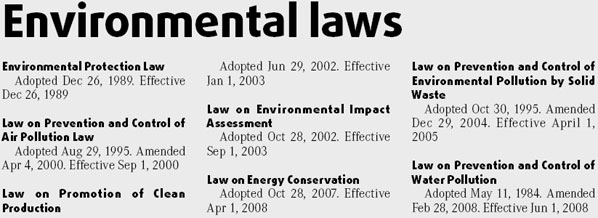


Zhang Changlin will never forget the day his life turned into a nightmare.
On September 12, 1979, he was working in a local chemical factory in Suzhou, Jiangsu province.
Zhang, 38 at the time, was a veteran in his team in charge of chemical storage and transportation. He had worked there for 23 years and was considered a model worker. But all that changed overnight.
In the afternoon, he asked for a short break to go home and check on his two young daughters, because his wife had gone to Shanghai that day.
Zhang was in a hurry, forgot to turn off a critical valve and about 150 tons of wastewater, 30 percent of which was liquid sodium cyanide, flowed into the Beijing-Hangzhou Grand Canal overnight.
Sodium cyanide is a highly toxic chemical that can severely damage the eyes, skin, respiratory tract and oral and gastrointestinal tracts.
"That day, I had so many things to take care of that I totally forgot about the valve," Zhang recalls in a Chinese media report.
After he finished his shift, Zhang went back home at 8 pm.

It wasn't until noon the next day that one of Zhang's colleagues checked the valve and discovered what had happened. The valve had been open for 15 hours, while highly toxic liquid dumped into the canal, affecting tens of thousands of local residents who depend on the river. Along the canal's shoreline dead fish and shellfish were everywhere.
More than 1,000 people were recruited to clean up the pollution. In the end, nobody was injured in the accident. But the direct economic loss of the chemical factory hit 34,800 yuan, a big number at that time.
By coincidence, the following day on September 13, 1979, China passed its first ever draft of the Environmental Protection Law of People's Republic of China.
Zhang was sentenced to two years in jail for violating hazardous material regulations.
Because there wasn't any legislation before the accident occurred, Zhang was later declared guilty in accordance with Article 115 of the Criminal Law, which was published but was not yet implemented at that time.
Wang Canfa, a Chinese professor at the China University of Political Science and Law, earlier told Chinese media that Zhang's case showed there were loopholes in the legislation on environmental protection, which could lead to challenges to the country's legal system. And Zhang's case pushed legislators to quickly fill the loopholes. Apart from Zhang's case helping to complete environmental legislation, the draft of Environmental Protection Law in 1979 came as a result of joint initiatives from the international community and domestic needs.
In 1972, the UN Conference on Human Environment was held in Stockholm, Sweden.
The conference drew attention to the need to preserve natural habitats to produce sustainable living conditions for all, but stressed that international cooperation was critical. The emphasis was on solving environmental problems, but also keeping in mind social, economic and developmental policy factors.
The Chinese government sent a delegation to the UN conference and brought back other countries' concepts and measures on protecting the environment.
China's attendance at that conference directly resulted in the country's first National Environmental Protection Conference in Beijing in August 1973.
During the conference, the draft regulation on environmental protection was drawn up and passed. It was regarded as China's first administrative regulation on environmental issues after the People's Republic of China was founded in 1949.
From 1973 to 1977, a series of related regulations were focused on controlling industrial wastewater, solid waste and waste gas; eliminating soot from chimneys; controlling forest cutting; stopping the trade of wildlife; preventing offshore pollution; treating radioactive sources; protecting drinking water resources; and pollution treatment in bodies of water like the Bohai Sea and Yellow Sea.
On Mar 5, 1978, the National People's Congress approved the plan to write environmental issues into the country's basic law - the Constitution of the People's Republic of China.
The Constitution stipulates: "The State protects and improves the living and ecological environments, and prevents and remedies pollution and other public hazards from affecting the environmentThe State ensures the rational use of natural resources and protects rare animals and plants. The misappropriation or damage of natural resources by any organization or individual by whatever means is prohibited."
The Third Plenary Session of the 11th Communist Party of China Central Committee was held in Beijing at the end of 1978.
The session adopted the policy of reform and opening up and shifted work of the Party and State from "taking class struggle as the key link" to economic development.
Highlighted for the first time was environment protection, which was closely related to economic development and industrial construction.
On the other hand, natural disasters from 1959 to 1961, combined with political events like the Great Leap Forward (1958-1959), and the "cultural revolution", meant the country's natural resources were overly exploited and could not meet the demands of economic development.
In order to protect its environment and support economic development, China passed its first draft of Environmental Protection Law in 1979, as the fundamental legislation for the country's green drive. The official version of the law was published 10 years later.
It is the cardinal law for environmental protection in China. The law established the basic principle for coordinated development between economic development, social progress and environmental protection, and defined the rights and duties of governments at all levels, all units and individuals with regards to environmental protection.
Since the passage of the draft Environmental Protection Law, China has enacted and promulgated many special laws on environmental protection which include laws on water pollution, air pollution, solid waste, marine environment, forestry, grasslands, fisheries, wild animals and agriculture.
To implement the State's environmental protection laws and regulations, people's congresses and governments at local levels, have enacted and promulgated more than 600 local laws on environmental protection according to the conditions in their own areas.
China has been one of the world's best economic growth stories, maintaining double-digital GDP growth for decades.
But the economic boom has also dramatically changed its environmental landscape, polluting the water and air, desertifying the land and diminishing the country's natural resources at terrifying rates."
Recognizing the escalating costs of pollution, the Chinese government has been reviewing its energy-guzzling and environment-wrecking model of growth borrowed from developed countries.
In 2005, the country adopted a renewable energy law, amended the energy conservation law, and water pollution control and prevention law.
In 2006, when the country's economic development entered its 11th Five-Year (2006-10) Plan, China mapped out an ambitious blueprint on energy conservation and environmental protection.
The country plans to cut energy consumption per unit of gross domestic products (GDP) by 20 percent, and reduce sulphur dioxide emissions and chemical oxygen demands by 10 percent from 2006 to 2010.
That underlines the government's eagerness to embrace an environmentally friendly growth model to rebuild its economy.
The government is not meant to slow down growth but wants to ensure it's green.
That marks one of the biggest changes in China since the country embraced the reform and opening-up policy in 1978.
"However, like early environmental laws in the United States, China's [laws], though broad in coverage, still suffer from weaknesses that limit their effectiveness," says Alex Wang, an attorney and director of the China Environmental Law Project at the US-based Natural Resources Defense Council. Wang posted this comment in his article titled "Environmental protection in China: the role of law", published in February, 2007 on a website called China Dialogue.
"They [environmental laws and regulations] frequently 'encourage' rather than 'require'," he continued. "Perhaps most importantly, enforcement provisions are often extremely weak."
These observations are critical in encouraging the Chinese government to continue on its path to creating sound environmental laws to protect the country for generations to come.

(China Daily 04/07/2008 page2)













